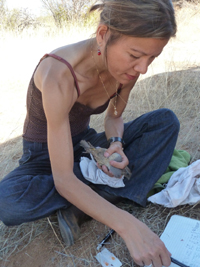
She will talk about that work as part of the Idyllwild Community Recreation Council’s popular speaker series at 6 p.m. Thursday, Jan. 17, at the Nature Center on Highway 243.
“Quail Tales: Lessons from quail about the origin of species” promises to be an adventurous exploration of evolution and how diversity develops in species.
“I ask the same questions [in fieldwork] that Darwin does,” Gee said. “If people are interested in diversity and how that diversity develops, then I think they’ll find my research interesting. For instance, why are some species [like dogs and birds] so diverse while others, think Koala bear and platypus, are not diversified at all.”
As director of the James Reserve, Gee now has the opportunity to study evolution in her own backyard. One of the zones where two types of quail have hybridized, Gambel’s and California, is in the Santa Rosa Mountains near Pinyon.
Another area where Gee conducts research is in the central Sonoran desert in Mexico, near Alamos. “What are the factors that bring these two types of quail together and cause them to interbreed?” asks Gee, a constant question she is always investigating. “The two areas have the same two types of quail but the circumstances are quite different. In Mexico there are ranches, more supplemental food sources, and consequently more quail. Here there are fewer quail and fewer opportunities to mate and yet the hybridization continues in both areas.”
Gee said she would be speaking about how a field biologist conducts field research. She’ll also explain, using the Santa Rosas and the San Jacintos as an example, how one can actually watch the evolutionary process and better understand how diversity is created.
“I’ll be talking about ecological diversity in our own mountain island environment and what kind of evolutionary scenes are happening in our own backyard,” she said. “What environmental, climate and molecular changes allow some species to adapt and survive while others could not.”
Gee, who has been the James Reserve director only since early summer, accepted the speaking engagement for another reason too. “This will also be an introduction of me and the reserve to the broader Idyllwild community,” she said.
Gee holds both master’s and doctorate degrees in ecology and evolutionary biology from Princeton University. She subsequently taught and conducted fieldwork in the Galapagos Islands, Barbados and the Concord Field Station in Massachusetts, and completed postdoctoral work at Harvard, Cornell and the University of California, Davis.
Gee’s presentation is co-sponsored by the Friends of the San Jacinto Mountains. A wine and cheese reception precedes the event at 5:30 p.m. Gee speaks at 6 p.m. There is no charge for either the reception or Gee’s talk.










